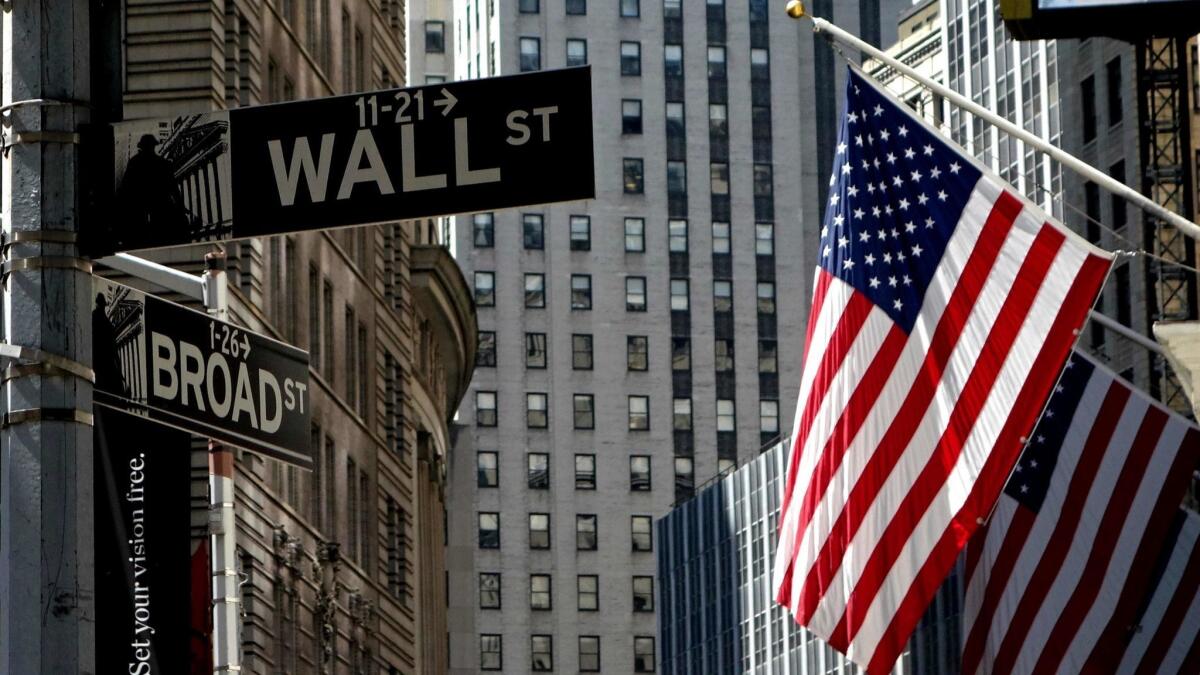Stocks slip at the end of a strong February

- Share via
Stocks finished modestly lower Thursday, closing out another listless day of trading on Wall Street with a third straight loss for the benchmark Standard & Poor’s 500 index.
Technology, energy and consumer products companies pulled down the market Thursday, offsetting gains by consumer goods, utilities and real estate firms.
Investors weighed a government report that showed U.S. economic growth slowed at the end of last year. Traders also had their eye on a mixed batch of corporate earnings reports.
“You have a market that’s trying to digest what’s next right now. Really, all week it’s been kind of consolidating a little bit,” said Willie Delwiche, investment strategist at Baird. “You also have month-end selling, which is not uncommon.”
Despite a sluggish few days, the S&P 500 index still gained 11.1% over January and February, its best start to a year since 1991. The index has posted a monthly gain nine of the last 12 months.
On Thursday, the S&P 500 fell 7.89 points, or 0.3%, to 2,784.49. The Dow Jones industrial average fell 69.16 points, or 0.3%, to 25,916. The Nasdaq composite index fell 21.98 points, or 0.3%, to 7,532.53. The Russell 2000 index of smaller-company stocks fell 5.50 points, or 0.3%, to 1,575.55.
Major indexes in Europe closed mostly higher. South Korean stocks fell after talks between President Trump and North Korean leader Kim Jong Un ended abruptly without an agreement.
The market’s strong start to the year is in stark contrast to a dismal end to 2018, when a plunge almost put an end to the bull market. The gains so far this year are being pushed by investor confidence in prospects for steady growth and an increasingly hands-off Federal Reserve.
Still, the modest decline in stocks this week after the S&P 500’s barely broken string of weekly gains suggests the market’s momentum has started to stall a little bit, Delwiche said: “A flat week feels like something has changed.”
Investors are waiting for more details on U.S.-China trade negotiations. U.S. Trade Representative Robert Lighthizer has raised doubts about progress, telling lawmakers that “much still needs to be done” before the sides can reach an agreement over China’s technology strategy and other issues.
The latest snapshot of the U.S. economy shows that it grew in the fourth quarter at its slowest pace since the beginning of 2018. The growth still beat economists’ forecasts, however, which pushed bond yields higher Thursday. A bright spot in the latest report shows that for the full year, the economy grew at its fastest pace since 2015.
Still, signs that the global economy will slow this year, dragging down corporate profits, remain a concern for investors.
On Thursday, several tech companies reported sub-par quarterly results.
HP plunged 17.3% to $19.73 after it reported that weaker sales of printers and computers hurt its fiscal first-quarter profit. It also expects revenue from printer supplies to fall in 2019 because of weaker global demand.
Cloud-computing company Box nosedived 18.6% to $20.24 after delivering a weak forecast. Priceline.com parent Booking Holdings slumped 11% to $1,697.04 after warning of a slowdown of sales in Europe.
Results from other companies put traders in a buying mood.
Monster Beverage climbed 8.7% to $63.83 on strong sales growth for its signature energy drinks. The higher drink sales pushed revenue and profit beyond Wall Street forecasts, and the company plans to buy back $500 million in stock.
J.C. Penney surged 22.6%, its second-biggest one-day gain, to $1.52 after the department store operator’s fourth-quarter results beat investor forecasts. The retailer had warned of a weak holiday sales period and its profit tumbled more than 70%. Still, the results and a key sales measure for retailers weren’t as bad as Wall Street expected. The company, which has been closing stores for years, said it would shut an additional 18 department stores as well as nine home and furniture stores.
SeaWorld Entertainment climbed 7.9% to $27.29 after it said its theme parks’ attendance rose last year for the first time since 2015 and posted a jump in revenue.
U.S. crude rose 0.5% to $57.22 a barrel in New York. Brent crude, used to price international oils, fell 0.5% to $66.03 a barrel in London.
Bond prices fell. The yield on the 10-year Treasury note rose to 2.72% from 2.69%.
The dollar rose to 111.42 yen from 110.04 yen. The euro strengthened to $1.1379 from $1.1370.
Gold fell 0.4% to $1,316.10 an ounce. Silver fell 0.8% to $15.63 an ounce. Copper fell 0.5% to $2.95 a pound.
Wholesale gasoline fell 0.3% to $1.63 a gallon. Heating oil rose 0.1% to $2.02 a gallon. Natural gas rose 0.5% to $2.81 per 1,000 cubic feet.
More to Read
Inside the business of entertainment
The Wide Shot brings you news, analysis and insights on everything from streaming wars to production — and what it all means for the future.
You may occasionally receive promotional content from the Los Angeles Times.










